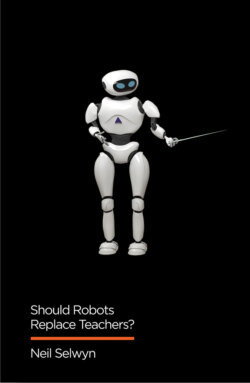Should Robots Replace Teachers?

Реклама. ООО «ЛитРес», ИНН: 7719571260.
Оглавление
Neil Selwyn. Should Robots Replace Teachers?
CONTENTS
Guide
Pages
Digital Futures Series
Should Robots Replace Teachers? AI and the Future of Education
PREFACE
Notes
ACKNOWLEDGEMENTS
ONE AI, Robotics and the Automation of Teaching
Robots and artificial intelligence
Teachers and teaching
AI and teaching – big hopes and complex issues
AI and education – seeing the bigger picture
Techno-solutionism and the increasing influence of Silicon Valley
Corporate desires to reform education
Political desires to reform/replace the teaching profession
The future of work and end of the professions
The need to be critical
Conclusions
Notes
TWO Physical Robots in the Classroom
Robots in the classroom
‘Classroom teacher’ robots
Humanoid robot teachers
Companion and peer robots
Care-eliciting robots
The potential and practicalities of classroom robots
How it ‘feels’ to be taught by a non-human
The ethics of robot teachers
The politics of robot teachers
Conclusions
Notes
THREE Intelligent Tutoring and Pedagogical Assistants
The rise of the ‘intelligent tutor’
The first wave of pedagogical agents
Current trends in pedagogical agents
The potential and practicalities of pedagogical agents
A reduced synthetic experience?
Manipulating individual action
The ethical dilemma of the robot teacher
Conclusions
Notes
FOUR ‘Behind-the-Scenes’ Technologies
Digital automations of contemporary teaching
Personalized learning systems
Learning analytics applications
Guidance and advice chat-bots
Automated essay grading
The potential and practicalities of automated educational software
Holding data to account
The inequalities of individualization
The labour politics of automated teaching
Conclusions
Notes
FIVE Revitalizing Teaching for the AI Age
What computers can (and can’t) do in education
Restating the case for human teachers
Recognizing AI as a double-edged sword
Scenario#1: AI as a prompt for less work?
Scenario#2: AI as a prompt for worse work?
What next? AI as a chance to renegotiate education
Conclusions
Notes
INDEX. A
B
C
D
E
F
G
H
I
J
K
L
M
N
P
R
S
T
U
Y
POLITY END USER LICENSE AGREEMENT
Отрывок из книги
Milton Mueller, Will the Internet Fragment?
Neil Selwyn, Is Technology Good for Education?
.....
These bigger-picture concerns are reflected in the choice of book title. The book might have been titled Can Robots Replace Teachers? However, it does not take long to see that the answer to this particular question is a resounding ‘Yes’. As the next five chapters will detail, there are already plenty of devices, systems and applications that are capable of dealing with various aspects of teaching work. Another quickly answered alternative title would be Will Robots Replace Teachers? Again, in short, the answer to this question is ‘Probably … if we let them’. There is already a growing appetite for specific forms of teaching work no longer being carried out by humans – for example, taking attendance registers and grading assignments. Instead, the most pertinent question to ask is Should Robots Replace Teachers? Given that we are now starting to see the mainstream use of these powerful technologies, what do we want to happen?
Titling this book toward ‘should’ rather than ‘could’ moves the discussion into the realm of values, judgements and politics – reminding us that the integration of any technology into society should always be approached as a choice. The fact that automated teaching technologies are now being designed and developed does not mean that they will inevitably be used in consistent ways with predetermined outcomes. History shows that technological change is non-linear, contingent and influenced by the different social contexts in which it is implemented. The ways in which technology unfolds across societies are never fully predictable or knowable. This uncertainty is what makes the prospect of any new digital technology exciting (but also dangerous). As such, it is crucial that we consider the possibility of alternative technological pathways and different digital futures for education.
.....